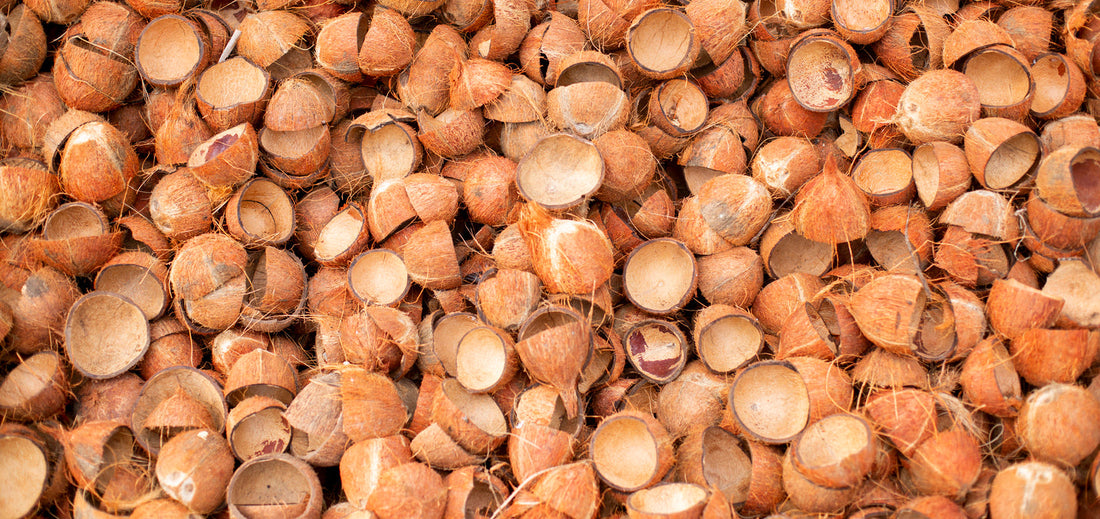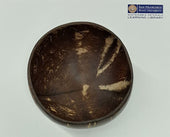Coconuts are celebrated worldwide for their versatility and nutritional benefits. However, an often overlooked issue is the massive coconut waste generated every year. Countless tons of coconut shells and husks are discarded, causing environmental concerns. In this article, we explore how coconut waste is becoming a global issue, its environmental impact, and why innovative solutions are the need of the hour to turn this waste into usable eco-friendly products.
Understanding the Coconut Waste Phenomenon
Coconuts are a staple in many tropical regions, especially in South East Asian countries like Vietnam, Indonesia and Thailand along with South Asian countries like India and Sri Lanka where coconut farming & selling coconut products is the livelihood for a vast majority of the population. Coconut farming is mainly done for the economical value of its fruit. The components of a coconut such as its water, milk, oil, and meat hold the highest value. Yet, after these parts are harvested, the remaining shells and husks are often left to rot or end up in landfills. In countries like Vietnam, where coconut farming is a significant economic activity especially in the Ben Tre province, the volume of waste is an existing concern. Without proper disposal methods, this waste contributes to environmental degradation. Similarly, in India which is one of the largest producers of coconuts in the world, its cities are facing a growing crisis of disposing of tender coconut waste.
The problem of coconut waste is not just limited to these countries. Across the globe, the lack of efficient recycling practices leads to pollution and loss of potential resources. Addressing this issue requires innovative thinking and sustainable practices.
The Environmental Impact of Coconut Waste
Discarded coconut shells and husks decompose slowly, releasing methane, a potent greenhouse gas, into the atmosphere. This contributes to climate change, aggravating the environmental crisis. In many regions, coconut waste is burnt, releasing harmful gases such as Carbon Dioxide and Methane that affect air quality and human health.

Additionally, coconut waste can disrupt local ecosystems. Piles of decomposing shells can become breeding grounds for pests, impacting agriculture and livelihoods. The sheer volume of waste can also burden waste management systems, leading to inefficient resource use.
How did we come across this issue?

While visiting a coconut farm in India, our founders at Nariyal saw how much waste was being leftover after extracting the water and meat from coconuts. They recognized the potential to turn this waste into something valuable. By collaborating with local farmers and artisans, they first began transforming discarded coconut shells into usable bowls, later introducing more eco-friendly products such as coconut wood spoons, cleaning brushes, candle holders, etc.

From Waste to Wonder: Coconut Shell & Coconut Wood Products
Our mission at Nariyal is to promote sustainability by repurposing coconut waste into beautiful, functional products. This initiative not only reduces environmental impact but also supports local communities. By partnering with skilled artisans, we created products that preserve traditional craftsmanship while contributing to a circular economy.
Our approach involves using discarded coconut shells and reclaimed coconut wood to craft items that are both stylish and sustainable. This not only prevents waste from ending up in landfills but also provides artisans with fair economic opportunities.
The Process of Crafting Eco-Friendly Products from Coconut Waste
The crafting process of our products from discarded coconut shells and reclaimed coconut wood involves several steps, each focusing on sustainability and craftsmanship.
Here's a glimpse into how these products are made.
Sourcing and Cleaning
The first step involves sourcing discarded coconut shells and wood from local farms. The materials are then cleaned and prepared for crafting, ensuring they are free from impurities.
Crafting and Design
Skilled artisans shape and polish the coconut shells and wood into desired forms. This stage requires traditional techniques and great attention to detail, that helps craft these high quality, artisanal products.
Finishing Touches
Finally, the products undergo a finishing process, which may include natural polishing using coconut oil. The end result is a range of beautifully crafted items that embody sustainability and creativity.
Visit our story page to read about our complete coconut waste repurposing process with a graphical step by step flowchart.
Explore Eco-Friendly Products Made from Discarded Coconut Shells
The range of products made from coconut waste is vast and varied. From coconut bowls to intricate crafts, these items offer a sustainable alternative to conventional products. Here are some products you can craft by recycling discarded coconut shells:
- Coconut shell bowls
- Coconut shell candles
- Coconut shell candle holders
- Coconut shell cups/mugs
- Coconut shell vases
- Coconut shell planters
- Coconut shell wind chimes
- Coconut shell bird feeders
- Coconut shell coasters
- Coconut shell soap dishes
- Coconut shell salt and pepper shaker
- Coconut shell ladle
Coconut Shell Bowls
Coconut shell bowls are made from discarded coconut shells, which are cleaned and polished to reveal their natural beauty. They come in various sizes and can be used for serving food or as decorative items. These bowls are lightweight, durable, and biodegradable.
Coconut Shell Candles
Coconut shell candles offer a unique twist on traditional wax candles. The coconut shell acts as a natural holder for the candle while also adding a tropical touch to any room. These can be scented with essential oils and make for great eco-friendly gifts. Coconut wax or Soy wax can be used to fill the coconut shells.
Coconut Shell Candle Holders
Similar to coconut shell candles, coconut shell candle holders are perfect for creating an ambient atmosphere. They come in various shapes and sizes, making them versatile for different types of candles.
Coconut Shell Cups and Mugs
Coconut cups or mugs can be made from the larger coconut shells and can be used for hot or cold drinks. They are lightweight, durable, and add a fun touch to any drinkware collection.
Coconut Shell Vases
Coconut shell vases make for beautiful and sustainable home decor pieces. They can be used to hold flowers or as standalone decorative items. Each vase is unique in its shape and texture, adding character to any space.
Coconut Shell Planters
Gardening enthusiasts will love planters made from coconut shells. The natural fibres of the shells are breathable and promote healthy plant growth. They can be used for indoor or outdoor plants and add a tropical touch to any garden.
Coconut Shell Wind Chimes
Wind chimes can be made from coconut shells, adding a unique element to any outdoor space. The gentle tinkling sound they create is soothing and perfect for creating a peaceful ambiance.
Coconut Shell Bird Feeders
Coconut shell bird feeders not only provide nourishment for our feathered friends but also repurpose discarded coconut shells. They can be hung from trees or placed on a flat surface, adding charm to any garden while promoting sustainability.
Coconut Shell Coasters
Made from polished coconut shells, coconut shell coasters are perfect for protecting surfaces from hot or cold beverages. They are easy to clean, durable, and add a touch of tropical flair to any home.
Coconut Shell Soap Trays
Coconut shell soap trays offer a natural alternative to plastic or ceramic options. They have drainage holes to prevent water buildup and can be easily cleaned. The unique texture of coconut shells also adds a decorative element to any bathroom.
Coconut Shell Salt and Pepper Shakers
You can add some island vibes to your dining table with salt and pepper shakers made from coconut shells. They are not only functional but also make for great conversation pieces at dinner parties.
Coconut Shell Ladle
Made from a single coconut shell, coconut shell ladles are perfect for serving soups, stews, and other dishes. They are lightweight, easy to clean, and add a unique touch to any kitchen utensil collection.
Sustainable Products Made from Reclaimed Coconut Wood
Reclaimed coconut wood is another valuable resource. Often considered a byproduct, this wood is strong and versatile, suitable for crafting furniture, utensils, and more. Coconut wood is a durable and sustainable alternative to traditional wooden utensils. Using coconut wood helps reduce deforestation and promotes sustainable resource management.
Coconut Wood Spoons, Forks, and Sporks
Spoons, forks, and sporks can be made from reclaimed wood from fallen coconut trees. They are lightweight, smooth to touch, and add a touch of rustic charm to any dining experience. Coconut wood spoons can be a great addition to your dining essentials. Have a look at how our artisans craft spoons and forks from reclaimed coconut wood.
Coconut Wood Bowls
Similar to coconut shell bowls, coconut wood bowls are made from reclaimed coconut wood. They come in various sizes and can be used for serving food or as decorative items. Each bowl has a unique grain pattern, making it a one-of-a-kind piece.
Coconut Wood Cutting Boards and Charcuterie Boards
Charcuterie boards and cutting boards made from coconut wood are not only functional but also add a touch of natural beauty to any kitchen. They are made from wood from the trunk of the fallen coconut trees, making them sustainable and durable. The smooth surface is gentle on knives and easy to clean.
Coconut Wood Serving Trays
Impress your guests with these elegant serving trays made from coconut wood. They are perfect for displaying appetizers, desserts, or drinks. The natural grains of the wood make each tray a work of art.
Discarded coconut shells and wood from fallen coconut trees offer endless possibilities for creating sustainable and eco-friendly products. By repurposing these natural materials, we can reduce waste and promote responsible resource management. Next time you see a coconut shell being thrown away, think of the many ways it could be transformed into something useful and beautiful! So go ahead and incorporate some sustainable daily use coconut products in your lifestyle and contribute towards a greener planet!
Explore our complete range of eco-friendly coconut products here.

The Benefits of Choosing Eco-Friendly Coconut Products
Opting for products made from coconut waste offers numerous benefits, both for the environment and consumers. Here are some reasons why eco-conscious individuals are choosing these sustainable alternatives:
Environmental Conservation
By supporting products made from coconut waste, consumers contribute to environmental conservation. These products help reduce landfill waste, lower carbon emissions, and promote responsible resource use.
Supporting Local Communities
Purchasing coconut waste products supports artisans and local communities. At Nariyal, we promote fair trade practices to ensure that artisans receive a respectable wage, empowering them to continue their craft and improve their livelihoods. We actively partner with coconut farms and artisans in Vietnam who support our vision by crafting daily usable products from discarded coconut waste.

Promoting Sustainable Living
Eco-friendly coconut products align with the principles of sustainable living. They encourage mindful consumption and offer alternatives to single-use items, making it easier for consumers to reduce their ecological footprint.
Frequently Asked Questions
Why are coconut waste products considered sustainable?
Coconut waste products are deemed sustainable because they utilize materials that would otherwise be burnt or end up in the landfill. By recycling coconut shells and wood, these products reduce the demand for natural resources, promote biodiversity, and lower carbon emissions associated with traditional manufacturing processes.
How can I ensure the coconut products I purchase are ethically sourced?
To ensure you are buying ethically sourced coconut products, look for certifications such as Fair Trade or B Corp and consult suppliers directly about their sourcing practices. These certifications and inquiries can help ensure that the products support fair wages and ethically safe working conditions for the artisans involved in their production.
What are the benefits of using coconut shells in home decor?
Using coconut shells in home decor offers several benefits, including adding a natural and rustic aesthetic to your living space. Additionally, these items are typically durable and lightweight, making them practical for everyday use while also aligning with sustainable living practices.
How can businesses incorporate coconut waste products into their sustainability strategies?
Businesses can integrate coconut waste products into their sustainability strategies by replacing traditional materials with sustainable alternatives offered by these products. Additionally, showcasing their commitment to environmental responsibility can enhance brand image and appeal to eco-conscious customers.
Are there any health concerns with using coconut-based kitchen utensils?
Coconut-based kitchen utensils are generally safe for everyday use. They are non-toxic and free from harmful chemicals often found in plastic alternatives. However, it's essential to care for them properly, avoiding prolonged exposure to water and heat to maintain their integrity and lifespan.

Get answers to more frequently asked questions by visiting our FAQ page.
The Future of Coconut Waste Recycling
The future of coconut waste recycling is promising, with potential applications extending beyond artisanal crafts. Innovations in technology and design could lead to new ways of utilizing coconut waste, making it a valuable resource in various industries.
From biodegradable packaging to sustainable construction materials, the possibilities are endless. By investing in research and development, we can unlock the full potential of coconut waste and drive meaningful change in waste management practices.

Innovative Applications for Coconut Waste
As the world continues to embrace eco-friendly solutions, the innovative applications of coconut waste are garnering interest across various sectors. Researchers and entrepreneurs are exploring ways to utilize coconut husks, shells, and fibers in novel technologies and sustainable products. For instance, coconut fibers have found their way into the fashion industry, where they are used to create clothing from coconut waste. These fabrics are not only durable but also offer breathability and natural antimicrobial properties, making them ideal for sustainable fashion lines.
Another groundbreaking area is the use of coconut shells as a renewable source of activated charcoal. This form of charcoal is in high demand in industries ranging from water purification to cosmetics, thanks to its natural filtering capabilities and environmental benefits. Coconut-derived activated charcoal provides an effective alternative to traditional sources, reducing the need for destructive mining practices.
By continuing to innovate and develop new applications, coconut waste recycling can pave the way for a more sustainable and resource-efficient future. The potential for growth and impact in this sector is vast, encouraging ongoing research and collaboration across industries to fully realize the benefits of coconut waste.
Community Engagement and Education
Building awareness about the potential of coconut waste recycling is essential in fostering a sustainable future. Community engagement initiatives can play a crucial role in educating members of society about the environmental benefits and economic opportunities offered by recycling coconut waste. Organizing workshops, seminars, and local gatherings can help illustrate the transformation of discarded coconut materials into valuable products, inspiring individuals to adopt eco-friendly practices in their daily lives.
Educational programs aimed at schools and universities can introduce students to sustainability concepts through hands-on experiences. By involving students in various sustainable projects, they can learn about the lifecycle of materials, the importance of reducing waste, and the innovation required to turn challenges into opportunities.

photo credit: the coconut waste project
The coconut waste project in Accra, in Ghana that was set up with a goal to have a green circular economy & provide livelihood opportunities for the locals through effective coconut waste management is one such great example. Such initiatives encourage the next generation to develop a sense of environmental stewardship and consider sustainable practices in their future endeavors.

photo credit: the coconut waste project
Moreover, collaboration with local artisans and businesses can provide an avenue for sharing knowledge and resources. By working together, communities can develop a robust network that supports the sustainable growth of coconut waste recycling industries. This not only benefits the environment but also stimulates local economies, creating jobs and promoting cultural heritage through the shared use of traditional and modern crafting techniques.
Economic Opportunities
The expansion of coconut waste recycling opens up diverse economic opportunities for both individuals and communities. As demand for sustainable products grows, cottage industries focused on coconut waste can thrive, offering job opportunities and income to local populations. Artisans can showcase their skills by creating intricate designs and functional items that appeal to eco-conscious consumers.

At a larger scale, investment in coconut waste recycling technology can lead to the development of innovative industries. For example, the production of biodegradable packaging made from coconut fiber not only provides an environmentally friendly alternative to traditional packaging materials but also establishes new manufacturing sectors. This development can attract investments, support infrastructure growth, and inspire further innovations in sustainable product design.
By fostering public-private partnerships, governments and businesses can work together to tap into the economic potential of coconut waste recycling. Incentives such as tax breaks or subsidies can encourage companies to invest in sustainable practices, driving growth in the sector. Simultaneously, policy frameworks that support ethical sourcing and fair trade practices can ensure that economic benefits reach marginalized communities involved in coconut-related industries.
Future Trends and Innovations
The coconut waste recycling industry is on the brink of numerous advancements and innovations that promise to revolutionize the sector. Technological breakthroughs in material science are leading to the development of high-value products derived from coconut waste, such as advanced composites for the automotive and aerospace industries. These materials, which are lightweight, durable, and sustainable, have the potential to replace conventional materials with high carbon footprints, thus contributing to environmental conservation efforts.
Another area of interest is the use of biotechnology in enhancing the properties of coconut-derived materials. For example, researchers are exploring ways to modify coconut fibers through genetic and chemical means to improve their strength, flexibility, and moisture resistance. These enhancements open up new possibilities for the use of coconut materials in industrial applications, further establishing them as viable alternatives to synthetic options.
The potential of coconut waste in the renewable energy sector is also gaining attention. The conversion of coconut shells and husks into biofuels offers a sustainable energy source that reduces dependence on fossil fuels. This approach not only mitigates greenhouse gas emissions but also provides an additional revenue stream for communities and businesses involved in coconut waste recycling.
Challenges and Solutions in Coconut Waste Recycling
Despite the promising potential of coconut waste recycling, several challenges need to be addressed to fully realize its benefits. One significant barrier is the need for advanced technology and infrastructure to process coconut waste efficiently. Investment in research and development is crucial to creating cost-effective and practical solutions for recycling coconut materials on a large scale.
Furthermore, logistical challenges in collecting and transporting coconut waste from farms and production sites to recycling facilities must be overcome. Establishing an efficient supply chain that connects rural areas with processing plants can help streamline operations and reduce waste through timely collection and processing.

On the regulatory front, governments must establish clear guidelines and standards for coconut waste recycling to ensure environmental safety and product quality. Encouraging policy measures, including incentives for sustainable business practices and penalties for non-compliance, can drive the industry's growth in a responsible manner.
Community resistance and lack of awareness also pose challenges to the adoption of coconut waste recycling. To overcome these barriers, continual education and engagement efforts are necessary. By showcasing the tangible benefits, such as job creation and environmental conservation, communities can be persuaded to participate in recycling initiatives and support sustainable living practices.
A Much Needed Call for Action
The journey towards a sustainable future with coconut waste recycling is one that requires collective efforts and commitment. By understanding the multifaceted opportunities and challenges within this sector, stakeholders can make informed decisions that promote environmental stability and economic growth. Whether it's through supporting local artisans, investing in technology, or advocating for supportive policies, every action counts in shaping a greener future.
As consumers, our choices hold power. By opting for products made from recycled coconut waste, we support the transition towards sustainable practices and demonstrate our commitment to preserving the planet for future generations. As businesses, embracing coconut waste recycling not only enhances brand reputation but also contributes to a sustainable bottom line.
As governments and policymakers, establishing a conducive environment for the growth of coconut waste recycling industries is crucial. This includes investing in research, providing incentives for sustainable practices, and fostering collaborations among stakeholders. By creating a supportive ecosystem, we pave the way for innovative solutions that address both environmental challenges and societal needs.
In conclusion, the potential of coconut waste recycling is vast and holds promise for transforming waste management practices worldwide. By harnessing this potential, we can contribute to a more sustainable and resource-efficient future. Let us take the necessary steps today to ensure that coconut waste ceases to be a challenge and instead becomes a part of the solution.
The journey towards sustainability starts with small steps. Whether it's choosing a coconut bowl or exploring waste coconut shell craft ideas, every decision counts. If you're passionate about sustainability and want to learn more about how you can make a difference, visit Nariyal and join the movement towards a greener future.







